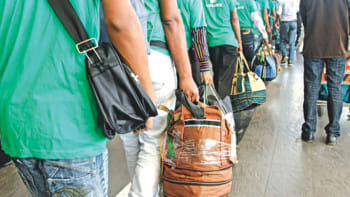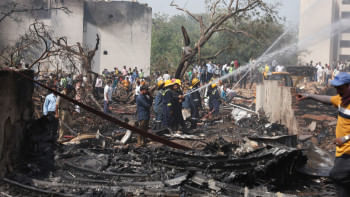UN experts express dismay over situation of Bangladeshi migrants in Malaysia

UN experts today expressed dismay about the situation of Bangladeshi migrants in Malaysia, who had travelled there in the hope of employment after engaging in the official labour migration process.
"The situation of Bangladeshi migrants who have lived in Malaysia for several months or is unsustainable and undignified," the experts said, according to a statement of the UN Human Rights Office of the High Commissioner (OHCHR) issued today.
They expressed concern that large sums of money were being generated through the fraudulent recruitment of migrant workers by criminal networks operating between Malaysia and Bangladesh.
They said migrants were being deceived, recruited by companies that are frequently fake, and obliged to pay exorbitant recruitment fees which pushes them into debt bondage.
"We received reports that certain high-level officials in both governments are involved in this business or condoning it. This is unacceptable and needs to end," the experts said.
The independent experts who made the statements have previously engaged with the governments of Malaysia and Bangladesh on these issues.
They include Tomoya Obokata, Special Rapporteur on contemporary forms of slavery, including its causes and consequences; Siobhán Mullally, Special Rapporteur on trafficking in persons, especially women and children; Gehad Madi, Special Rapporteur on the human rights of migrants and Robert McCorquodale (Chair-Rapporteur), Fernanda Hopenhaym (Vice-Chair), Pichamon Yeophantong, Damilola Olawuyi, Elzbieta Karska of the Working Group on business and human rights.
According to the independent researchers and migrants who talked to this newspaper, each of the migrants paid around Tk 500,000 for a job in Malaysia.
Since the end of 2022, more than 400,000 Bangladeshis have migrated to Malaysia for jobs under a syndicated of 100 Bangladeshi recruiting agencies selected by the Malaysian government. But, a significant portion of them are facing joblessness, underpayment or no payment. In total, there are around 800,000 Bangladeshis in Malaysia.
Earlier in 2018, Malaysia had frozen the recruitment of Bangladeshis saying that there was corruption, debt bondage and Han trafficking.
There were also numerous media reports on the labour exploitation and malpractices of migration in the Bangladesh-Malaysia corridor.
"Malaysia needs to take urgent measures to address the dire humanitarian situation of migrants and protect them from exploitation, criminalisation and other human rights abuses," the UN experts said.
They noted that many migrants find on arrival in Malaysia that they do not have employment as promised and are often forced into overstaying their visas. Consequently, these migrants risk arrest, detention, ill-treatment and deportation.
"Perpetrators of these exploitative recruitments must be held accountable," they said, adding that so far action taken against these private businesses and fraudulent recruitment companies have been wholly insufficient, both in Bangladesh and Malaysia.
"Meanwhile, vulnerable migrants have been criminalised and some have faced severe reprisals for reporting the exploitation suffered," they said.
They urged Malaysia and Bangladesh to investigate and address the situation.
"Malaysia must govern labour migration more effectively by adopting adequate safeguards," the experts said.
They urged the country to fulfil its obligations under the UN Guiding Principles on Business and Human Rights to protect migrant workers against human rights abuses by businesses operating in Malaysia and ensure that these businesses respect human rights.
Malaysia must also step up efforts to identify, protect, and assist victims of exploitation, enforce existing legal protections against trafficking in persons and uphold the country's international human rights obligations, the experts said.

 For all latest news, follow The Daily Star's Google News channel.
For all latest news, follow The Daily Star's Google News channel. 







Comments